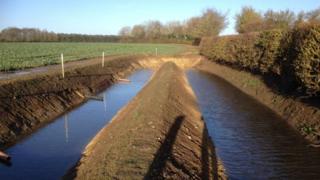 Image copyright
Wensum Alliance
Image copyright
Wensum Alliance
The amount of harmful sludge entering rivers from farmers' fields can be more than halved with special ditches, a new study found.
The Rivers Trust said its research showed only 14% of UK rivers are in a healthy state.
That health can be damaged by sediment containing fertiliser chemicals which can harm water quality and fish.
Scientists in Norwich dug and tested sediment traps beside the River Blackwater in Norfolk for the project.
The study by the University of East Anglia (UEA) and the Wensum Alliance used traps near the Blackwater - a tributary which flows into the River Wensum at Lenwade, which in turn flows through Norwich.
They then tested the water downriver and found a 58% reduction in sediment year on year.
One of the ditches trapped seven tonnes of sediment.
Prof Andrew Lovett, of the UEA, said: "From the farmers' point of view they can dig it up and put the fertiliser back onto the land."
Farmer Poul Hoveson said: "One of the really interesting things is that we can optimise our food production and output and yield without polluting the waterways."
Some traps were placed near roads, which is another source of pollution.
Dr Richard Cooper, lecturer in environmental sciences at the UEA, said the sediment was harmful to rivers because it "smothers the gravel bed" which fish use to spawn and "contains nutrients and pesticides which contaminate water".
He added: "It also contains organic matter which is decomposed by bacteria which consume oxygen, reducing the amount of oxygen for fish, which then suffocate."
Arlin Rickard, chief executive of The Rivers Trust, said sediment pollution was "expensive to remove from drinking water".
"We must redouble our efforts to work with farmers to protect soils, water and air as key ecosystem services and public goods."
The story features on BBC Inside Out at 19:30 BST on Monday.